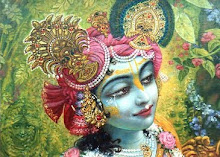Tulasi: One who has no comparison.
Vrindavani: One who first manifested in Vrndavana.
Vrinda: The goddess of all plants and trees.
Visvapujita: One whom the whole universe worships.
Puspasara: The topmost of all flowers, without whom Krishna does not like to look upon other flowers.
Nandini: Seeing whom gives unlimited bliss to the devotees.
Krishna-jivani: The life of Sri Krishna.
Visva-pavani: One who purifies the three worlds.
Vrindavani: One who first manifested in Vrndavana.
Vrinda: The goddess of all plants and trees.
Visvapujita: One whom the whole universe worships.
Puspasara: The topmost of all flowers, without whom Krishna does not like to look upon other flowers.
Nandini: Seeing whom gives unlimited bliss to the devotees.
Krishna-jivani: The life of Sri Krishna.
Visva-pavani: One who purifies the three worlds.


